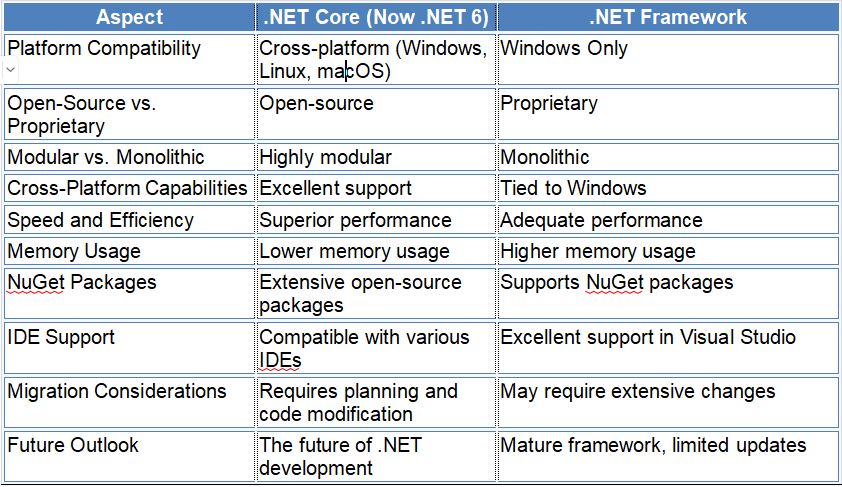Difference Between .NET Core and .NET Framework: Unveiling the Key Distinctions
In today’s rapidly evolving world of software development, choosing the right technology stack is crucial. Two prominent contenders in the realm of .NET development are .NET Core and .NET Framework. Both serve as robust platforms for building powerful applications, but they have significant differences that can impact your development projects. In this blog post, we’ll dive deep into the distinctions between these two frameworks and help you make an informed decision. Let’s embark on this enlightening journey.
Table of Contents
Introduction
.NET development has come a long way since its inception, and it’s important to keep up with the latest trends and technologies. One of the most significant shifts in the .NET ecosystem was the introduction of .NET Core. To understand its significance, let’s first delve into the historical background.
Historical Background
.NET Framework has been a dominant player in the Windows development landscape for years. However, with the advent of cross-platform development and the need for high-performance applications, Microsoft introduced .NET Core in 2016. This marked the beginning of a new era in .NET development, with a focus on modernization and innovation.
Discover a wealth of C# interview questions by visiting our page on C# interview questions: C# Interview Questions.
Core Concepts
3.1. .NET Core
.NET Core, now known as .NET 5 and later as .NET 6, is an open-source, cross-platform framework designed for modern application development. It’s highly modular, allowing developers to include only the libraries they need, reducing the overall application size. .NET Core provides excellent support for microservices architecture and containerization.
3.2. .NET Framework
On the other hand, .NET Framework is a mature, monolithic framework primarily designed for Windows-based applications. It includes a comprehensive class library and has a long history of use in enterprise-level applications.
Explore the SOLID principles in C# for building robust and maintainable software architectures.
Key Differences (.NET Core and .NET Framework)
4.1. Platform Compatibility
There is a difference in between .NET Core and .NET Framework related to platform compatibility. .NET Core is designed to be platform-agnostic, running seamlessly on Windows, Linux, and macOS. .NET Framework, on the other hand, is tightly bound to the Windows operating system.
4.2. Open-Source vs. Proprietary
.NET Core is open-source, fostering a vibrant community of contributors and enhancing transparency. .NET Framework is a proprietary framework developed and maintained by Microsoft.
4.3. Modular vs. Monolithic
.NET Core’s modular approach enables developers to use only the necessary components, reducing the application’s footprint. .NET Framework, being monolithic, requires the inclusion of a larger set of libraries.
4.4. Cross-Platform Capabilities
.NET Core’s cross-platform support is a game-changer, allowing developers to target multiple operating systems with ease. .NET Framework is inherently tied to Windows.
Performance Comparison
5.1. Speed and Efficiency
.NET Core exhibits superior performance in terms of speed and efficiency, making it an excellent choice for high-performance applications.
5.2. Memory Usage
Thanks to its modular nature, .NET Core boasts lower memory usage compared to the resource-intensive .NET Framework.
Development Ecosystem
6.1. NuGet Packages
Both frameworks support NuGet packages, but .NET Core benefits from a more extensive collection of open-source packages.
6.2. IDE Support
Visual Studio provides excellent support for both frameworks, but .NET Core’s cross-platform nature extends your choice of development environments.
Explore the world of dictionaries in C# programming to efficiently manage and manipulate key-value pairs.
Migration Considerations
7.1. Legacy Projects
Migrating legacy .NET Framework projects to .NET Core requires careful planning and may involve code modifications.
7.2. Migration Tools
Microsoft offers migration tools and guidance to assist in the transition from .NET Framework to .NET Core.
Future Outlook
.NET Core, now .NET 6, is the future of .NET development, with Microsoft focusing its efforts on this open-source, cross-platform framework. As such, it’s recommended for new projects.
Differences between .NET Core and .NET Framework

Conclusion
In conclusion, the choice between .NET Core and .NET Framework depends on your specific project requirements. .NET Core, now .NET 6, offers versatility, performance, and cross-platform compatibility, making it the preferred choice for modern application development. However, for legacy projects deeply entrenched in the Windows ecosystem, .NET Framework remains a viable option.
Unlock the potential of software design with the Factory Design Pattern in C#, revolutionizing efficient object creation and code flexibility.
FAQs
What is the primary advantage of .NET Core over .NET Framework?
The primary advantage of .NET Core (now .NET 6) is its cross-platform compatibility, allowing you to develop applications for Windows, Linux, and macOS.
Can I migrate my existing .NET Framework application to .NET Core?
Yes, you can, but it may require code modifications and careful planning. Microsoft provides migration tools and guidance to assist in the process.
Which version of .NET Core should I choose for a new project?
For new projects, it’s recommended to choose the latest version, which is .NET 6 at the time of writing, as it represents the future of .NET development.
Are there any performance improvements in .NET Core compared to .NET Framework?
Yes, .NET Core (now .NET 6) offers significant performance improvements, particularly in terms of speed and memory usage, making it ideal for high-performance applications.
How can I decide whether to use .NET Core or .NET Framework for my project?
The decision should be based on your project’s specific requirements. Consider factors such as platform compatibility, performance needs, and the availability of legacy code when making your choice.




